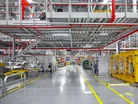Jaguar Land Rover: Accelerating a Sustainability Drive

Jaguar and Land Rover (JLR) have been known as two of the finest premium car brands to come out of British automotive manufacturing, and, as a result, they tend to have to funds to drive innovation in the industry. The companies latest announcement give a clear indication of what’s to come for car manufacturers the world-over ─ new, improved, sustainable interiors, in an effort to clean up the world’s oceans.
The car manufacturers have announced that they have entered a new partnership with Italian synthetic fibre company, Aquafil, and will invest in the companies industry-leading Econyl fabric. Econyl is a material repurposed from plastic waste, which JLR will use in the production of trim and floor mats for all of the upcoming models in their manufacturing lineup.
How is Econyl Made?
According to industry insiders, “Econyl is made from a combination of recycled industrial plastic, fabric offcuts from clothing manufacturers, fishing nets from the farming industry, and those abandoned in the ocean ─ known as “ghost nets”,
Using chemical treatments, the different materials are broken down into the raw nylon material which is then turned into Econyl yarn. This has the same properties as regular nylon and can then be used to create carpets and other trim materials. It has previously been used to make clothing and watch straps.”
JLR is targeting the use of Econyl yarn after Aquafil announced that the production of the fabric has just 10 percent of the global warming impact of creating “normal” nylon, courtesy of the lower CO2 emissions and savings in crude oil use. The move shows JLR’s commitment to progressively complete their internal ‘Destination Zero’ policy, which is the company’s conscious effort to reduce its carbon emissions for the betterment of the global environment.
The companies senior engineer of interior systems, Adrian Iles, said that “Minimising waste, re-using materials and reducing carbon emissions sits at the heart of our Destination Zero mission. This pioneering materials research is one of the key ways we’ll achieve this and is an integral part of our design offering to our customers.”
- The University Manufacturing Circuit Boards from LeavesSustainability & ESG
- Schneider Electric's Commitment to Sustainable ManufacturingSustainability & ESG
- Lenovo & Saudi Alat Building Green Manufacturing FacilitySustainability & ESG
- Nissan Brings Biodiversity to the Factory through RewildingSustainability & ESG

